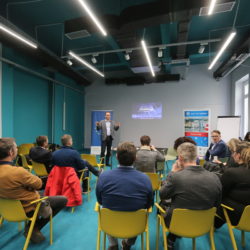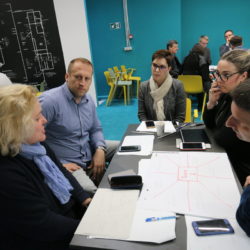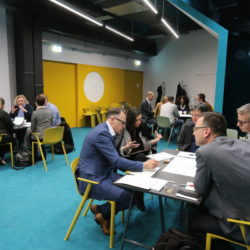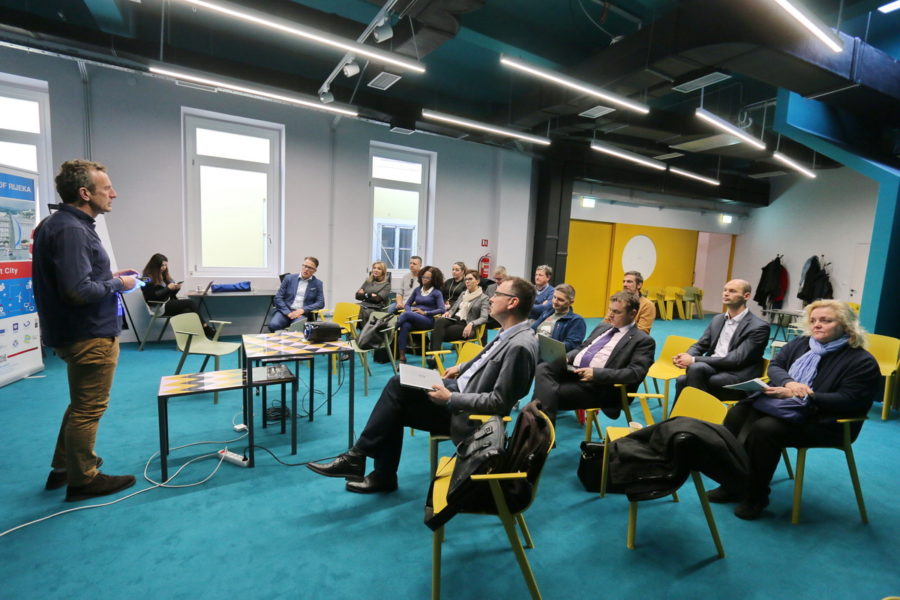
A workshop was held at RiHub titled “Building a Creative Ecosystem“ within the EU project “Digital Cities Challenge“ .
At the workshop, about twenty representatives of the academic, business and public sectors discussed creative cooperation models aimed at sustainable urban development in our city.
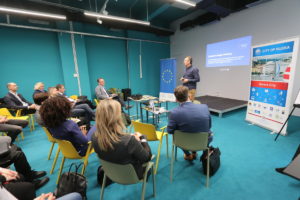
Alain Heureux, professional in the field of innovation, creativity and entrepreneurship from Brussels presented a methodology that connects Systemic Design Thinking
In the introduction, the head of the IT Department of the City of Rijeka Željko Jurić welcomed the participants, pointing out that the strategic plan Rijeka Smart City for the period 2019-2020 containing thirteen projects had been adopted not long ago. The adoption of the biannual strategic plan, as well as participation in the project titled “Digital Cities Challenge“, represent preparatory activities in the process of drawing up a new development strategy of the City of Rijeka for the period from 2021 to 2027, that, among others, will be focussed on further digital society development and the smart city concept.
The results of the analysis carried out within the “Digital Cities Challenge“ project have shown potentials for improving further cooperation between the private and academic sectors that is presently characterised by a weak connection of dispersed initiatives and projects. The project “Rijeka 2020 – European Capital of Culture” represents a good opportunity to link various stakeholders, so it was not a coincidence that the workshop was held in the premises of RiHub, at the address Ivan Grohovac, envisaged as premises for education courses, co-working and a place for implementing various cooperation programmes.
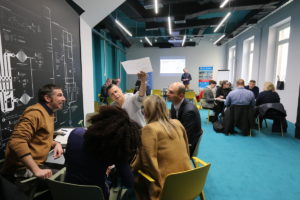
At the workshop, about twenty representatives of the academic, business and public sectors discussed creative cooperation models aimed at sustainable urban development in our city
Alain Heureux, professional in the field of innovation, creativity and entrepreneurship from Brussels presented a methodology that connects Systemic Design Thinking, following this workshop participants discussed the DNA system of Rijeka and defined the goals of “Creative Digital Rijeka”.
Understanding the city’s DNA system means, in fact, understanding the digital innovation potentials of the city of Rijeka, namely identifying the best local digital innovations and initiatives and their characteristics. Creative digital Rijeka is the name of the process within the project “Digital Cities Challenge“, which aims at mobilising the creative potentials of Rijeka, encouraging networking and cooperation between various sectors (academic and business sectors, public administration, civil society and citizens) in order to increase innovative force and realise sustainable digital transition in the live ecosystem of the city and the region.
A certain part of the project was proposed by the City of Rijeka, while workshop participants were invited to propose some new, innovative projects during the workshop and in the subsequent period. Some of the proposed city projects have been already included in the strategic plan Rijeka Smart City, like intranet development, an open data portal or e-procurement, some relate to city projects that are underway or are planned, like the Torpedo Production Park, Smart Cities’ Competence Centre that awaits approval of EU funding or the Incubator for creative technologies and the IT industry, while some of them have been recently proposed, like for instance the interactive information portal for entrepreneurs.
The workshop was held by Digital Cities Challenge project consultants – Blaž Golob, Stephanie E. Trpkov and Petra Karanikić.
The Rijeka programme “Digital Cities Challenge (DCC)” makes part of the initiative implemented by the European Commission by proving support to 42 EU cities in the development and implementation of digital policies aimed at improving the public services that the cities offer to its citizens and entrepreneurs.


